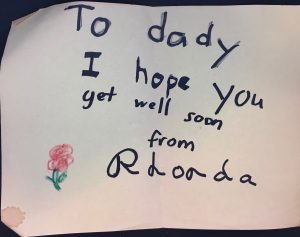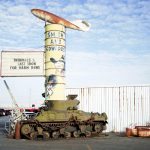
While teaching a class in California, a man told me about the time he almost died and what changed after. This was in response to one of our all-time favorite interview questions:
Tell me about a time when you didn’t know if you would make it.
This man, Joe,was not the stereotypical genealogy buff, nor was he somebody I would expect to get emotional in a group like that, more of a brawny kind of guy. But in the middle of my presentation, I asked the above question and Joe raised his hand from the back row. He said, “That’s some question. I’ve got one. I almost died last month.” Then he told the class how he was pinned under a piece of construction equipment in his job. He walked away with broken ribs, a big gash, and a new lease on life.
After I almost died, I’m grateful to get bills
Joe went on, “I thought I would die under that truck. After I got out, I was covered in blood and went away from the other guys and just sobbed. It changed everything for me. Now, when I get a bill in the mail I feel grateful that I get to pay it, because it means I am alive.”
It changed everything
Talking about it triggered powerful emotions right there in the class but he did not apologize for feeling it so deeply. I asked how the experience changed him and he said, “It changed how I look at everything.” He added, “I see the beauty in everyday things. Like, it’s crazy how beautiful.” He went on, “I used to worry about dumb stuff. Now I don’t even care if someone gets mad at me. I love every person in the human race.”

That reminded me of a young man named Sean Herrick. Although Sean’s experience ended differently, he still saw that beauty and love. I came to know about Sean because his family hired me to write a memorial that would be placed on a wall in a low income apartment complex that was being named for him. The Sean Herrick Memorial apartments house the formerly homeless, and Sean used to serve Thanksgiving Dinner there. Sean had struggled with mental health afflictions, physical disabilities and addictions as a result. He suffered from deep feelings of unworthiness and he empathized with the men at the apartment.

Sean was loving, artistic and an empathetic soul, but his family worried about him. Then, out of the blue he turned a corner. He described in his journal seeing beauty in every leaf, every human, and how he was filled with the incredible love of God’s grace. For the first time in a long time he felt whole. He wrote about the emotional transformation and how that feeling of love helped him get totally sober, and stay that way. Then, he was sitting in his car listening to music as he often did while it idled in the garage for warmth. In a freak accident, it exploded and Sean died in a horrible, tragic fire. Although stricken with grief, his family felt he was finally free, and that grace allowed him to find peace before he was called home.
You will know you have beat cancer when you get mad in traffic
 The book I just finished by Olympic gold medalist Scott Hamilton shares his experience making it through multiple brain tumors. He now often speaks to cancer groups, and he tells them,
The book I just finished by Olympic gold medalist Scott Hamilton shares his experience making it through multiple brain tumors. He now often speaks to cancer groups, and he tells them,
“You will know if you have beat cancer when you get mad in traffic again.” When you have cancer, you don’t sweat the small stuff like traffic, but after a full recovery life can return to a more normal state.
Setting priorities straight
In my class, Joe said his experience was the reason he came to a family history event on a beautiful day in Santa Cruz. I am sure he could be doing a hundred other things, but he was looking for ways to bring his children together more and to bond as a family. I encouraged his family history quest because in our work, we have learned that children who know they are part of something bigger than themselves are more resilient, and families with a strong narrative stay together.
Related: 5 ways Bruce Taught me about happy parenting

My own Dad almost died from a perforated bowel when I was just 10 years old. Toxins coursed through his body, and he spent weeks in intensive care. It was a harrowing time, and I can’t imagine my life if I had grown up without my wonderful father. He survived, though, and after that close call, he started taking better care of his body, and he said he would never worry about money again. (My mother then worried enough for both of them.)
It’s not your time, Bert
 Okay, do you have time for one more? If you are from Utah you may have heard of a quirky, funky store called Smith and Edwards. We are helping write the story of the founder, Bert Smith. I have listened to oral history of him telling about a few near-misses and this one is a “doozy.” Late one night he drove a big and trailer with several tons of cattle in the back, his truck started fish-tailing. Here is the transcript of Bert telling what happened next:
Okay, do you have time for one more? If you are from Utah you may have heard of a quirky, funky store called Smith and Edwards. We are helping write the story of the founder, Bert Smith. I have listened to oral history of him telling about a few near-misses and this one is a “doozy.” Late one night he drove a big and trailer with several tons of cattle in the back, his truck started fish-tailing. Here is the transcript of Bert telling what happened next:
I had just reached the top pulling a big, long bumper hitch. Last bumper hitch I will ever pull with cattle in it, if I ever pull another one. It started fish-tailing. Pretty quick it had tipped the cattle over, cattle flying out. I got a little excited and the voice of the Lord came to my mind very vividly, ‘Be calm, it’s not your time.’ I can remember very plain. I relaxed just like I was going to watch something happen, a big wreck and I was just going to sit there and watch. And I was thinking, ‘This is going to be a doozy.’ And I don’t use that word, but that was the word.
I’ve been in a lot of truck wrecks. And boy it was a doozy.
But I never got hurt. And I didn’t get shock. The lady that came up, a paramedic, and she said, ‘I’ll give you a shot of morphine if you’re in shock. I’ll give you a shot.’ I put my arm around her and said, “Do I feel like I am in shock, dear?” she said, “No, you are completely calm. How can that be?”
Related: Surviving an avalanche
Learning about these people’s experiences reinforces my belief that everyone has an amazing story, and you can never tell what someone might teach until you ask. Also, ask yourself if you have ever had a near miss. Have you ever overcome a serious illness, come close to the brink in business or a relationship, or had a near death experience? Write about it.
Related: Writing about the hard stuff
We have a free oral history interviewing tutorial or check out more great interview questions here.
If you’d like help with your story, please reach out to us. We coach, interview, write and edit.
Rhonda Lauritzen is the founder and an author at Evalogue.Life – Tell Your Story. Rhonda lives to hear and write about people’s lives, especially the uncanny moments. She especially enjoys unplugging in nature. Check out her latest book Remember When, the inspiring Norma and Jim Kier story.
Do a family history interview

Sign up and we will email you a free, printable download of our mini-course to conduct a great oral history interview. You will be done in a week or less.


Pingback: Is Yours a Redemption Story? - Tell Your Story with Evalogue.Life
Pingback: How to Curate your Canon of Personal Business Stories - Evalogue.Life - Tell Your Story